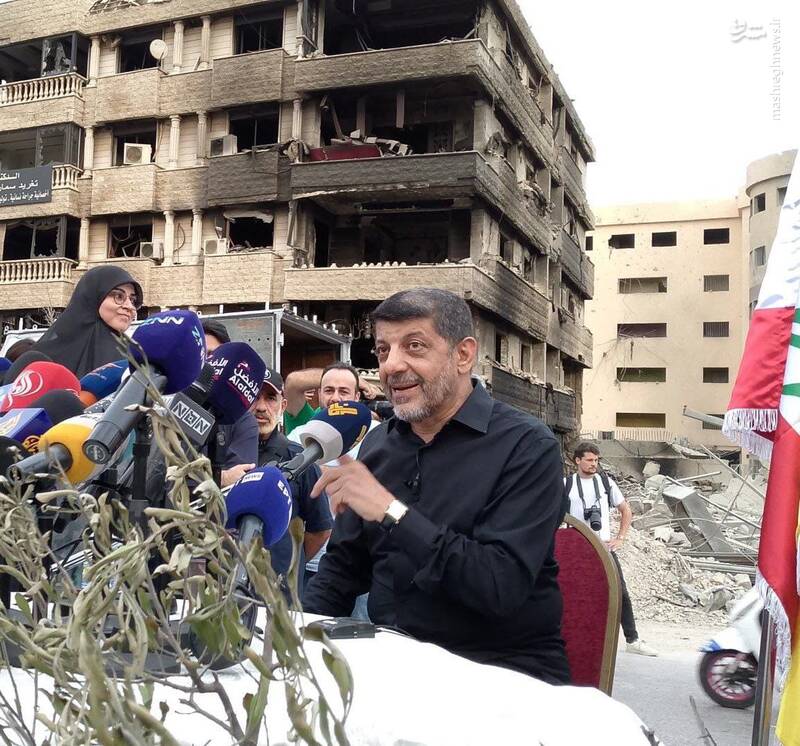Ali Hejazi, the secretary-general of the party in Lebanon elaborated on the Israeli crime to Al-Mayadeen news network, saying: "The attack on our office came after successive threats against us since the beginning of the war. The targeted building was used by the party and there were civilians in it. We held many meetings in this building during the war and this building was known to everyone."
Confirming martyrdom of Afif, Hejazi said that Hezbollah media chief was in the building by accident. The purpose of such attacks is silencing the media and political voice of the resistance because it severely annoys them, according to him."We are backers of resistance and this resistance will win with or without us. Hajj Mohammad Afif did not fight with arms and did not command a military unit. He led a media unit."
Hezbollah issued a statement confirming the martyrdom of Afif in the path of resistance and considered him as an "outstanding mujahed." The resistance movement also stressed on the "continuation of the path of the martyrs" and said that the "memory of the martyrs will never be forgotten and the Zionist enemy will pay a heavy price for its crimes."
Who was Mohammad Afif?
Afif joined Hezbollah in 1983 and was one of the founding members of this movement. He played an effective role in the movement's structure from the very beginning and over time became one of the key figures of it. In 2014, he was appointed as Hezbollah's media relations chief and played an important role in conveying the movement's messages and media coordination at the domestic and international levels, especially in times of crisis and conflict with the Israeli regime.
Before assuming the post of Hezbollah's media relations, Afif worked as the head of the news and political programs department at Al-Manar network, the official media outlet of Hezbollah. In this role, he oversaw the formulation and enforcement of media strategies, the main objective of which was to strengthen the movement's discourse and support its political positions.
He had a close relationship with the main leaders of Hezbollah. He was the media adviser of Hezbollah Secretary-General Seyyed Hassan Nasrallah, and was also close to Sayyed Nasrallah's predecessor Sayyed Abbas Mousavi. These close relations had strengthened his position as one of the influential figures of Hezbollah.
Afif was considered one of the important media figures of the Lebanese resistance. Recently, in a news conference, he challenged the threats of the Israeli regime. He said: "We are not afraid of the attack itself, let alone the threat, our resolve is firm and our resistance is standing."
Afif played an important role in presenting Hezbollah's positions and created a strong link between this movement and the media. Through interviews and holding news conferences, he presented Hezbollah's strategies and views to international audiences.
Afif was one of the most prominent media characters in the structure of Hezbollah. He managed to create a wide network of media contacts and use his expertise to promote the ideology of the party and defend its positions in various forums.
Israeli aims behind assassination of Afif
Indeed, afraid of publication of its crimes by media and having so far killed nearly 200 journalists in Lebanon and Gaza, Israel saw Afif as posing a serious barrier to its evil plans.
One of the important reasons that motivated Israeli leaders to assassinate Afif was that this official of Hezbollah with his skills in media and speech and by holding numerous news conferences did not allow the psychological and propaganda goals of the Israeli regime to come to fruition after pager explosions in mid-September and the assassination of the Hezbollah command network. He also published valid and timely news reports of the state of coherence and stability of Hezbollah and its battleground successes in order to provide the necessary psychological defense to the Lebanese public opinion against the enemy media offensive.
At a time Israel was threatening to assassinate Hezbollah officials every day, Afif, without fear of these threats, appeared in public and gave the most decisive speeches against the enemy, and by doing this, he showed that unlike the leaders of Tel Aviv, who are taking shelter tens of meters underground or have taken refuge in safe places, this Hezbollah official was like a soldier in the front line of the struggle against the enemy, showing that the threats of the enemy do not stop the Hezbollah officials from continuing the battle against occupation.
On the other hand, Israeli public opinion mainly does not trust the censored news from Israeli sources and follows the battlefield situation from the words of Hezbollah leaders.
A research conducted in May by Yuval Karniel and Amit Lavie-Dinur, both Israeli academic figures, shows that since October 7, Israeli media have suffered a general distrust, and according to polls, only about 20 percent of residents of the occupied territories trust Israeli mainstream media.
Therefore, it should be said that Afif at the top of the
media front of Hezbollah set up a major obstacle ahead of the Israeli
cabinet for psychological management of the critical home scene,
especially the growing criticism against continuation of the war on
northern front with Lebanon, and so the Israelis found no other way than
his assassination. But certainly, with assassination of Afif, the
Lebanese resistance's voice will not be silenced.
/129

